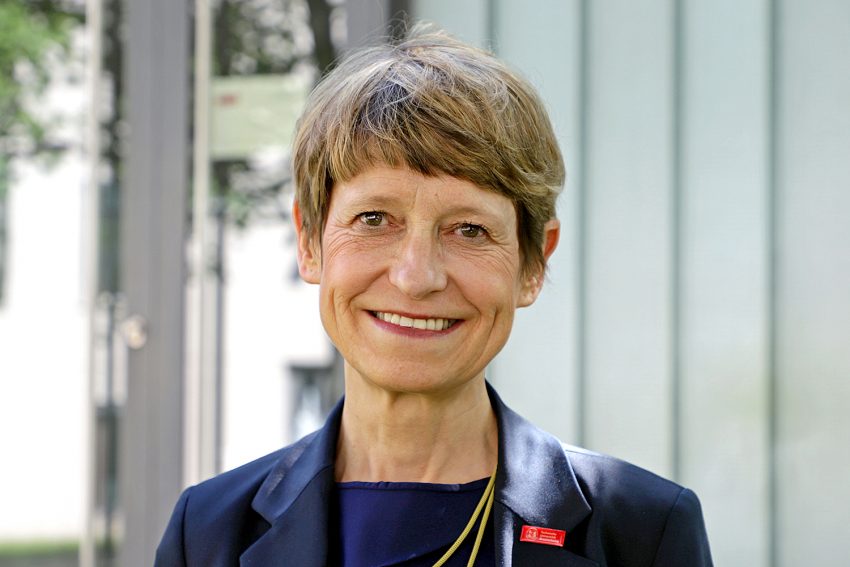Communicate internally – impact externally Our President’s spotlights
Internal communication is the topic of this Spotlight. It is the foundation for identity building within our university and provides the basis for effective, convincing external communication. Effective external communication helps us to let our university shine towards the outside world, so that our values, aims and strengths become clear and thus our very special profile becomes visible. The culture of communication is essentially the same, whether internal or external. Effective communication should be one thing above all: transparent! The more openly and participatively we manage to talk to each other internally, to negotiate and to create common ground, the stronger we can appear to the outside world. Successful and open communication with the outside world will also depend above all on whether we manage to find a common language. The negotiations around this are not always easy, sometimes they require a cultural change that is not accomplished overnight, sometimes it even takes a little courage, but always they require commitment and the conviction that only transparent communication will ultimately strengthen our university. I would like to contribute to creating an atmosphere in which we are all prepared to shape internal communication in such a way that it becomes the foundation for a stable sense of belonging. Only in this way can we also clearly demonstrate to the outside world what we stand for in research, teaching, transfer and administration, and what we are committed to.
Internal is external – universities are permeable institutions

Professor Angela Ittel, President of TU Braunschweig. Picture credits: Kristina Rottig/TU Braunschweig
As a university, we are in constant communication and exchange – with students, with cooperation partners, with school students and many other groups in society. There are no rigid boundaries between internal and external. Only through open and transparent exchange can we fulfill our mission as an educational and research institution.
All members of the TU Braunschweig, employees and students, are also ambassadors of our university in all their diversity. Consciously or unconsciously, directly or indirectly, we are all building bridges to society and to cooperation partners.
We take our internal communication culture and the resulting internal networking into the cooperation with our partners and into the exchange with society. This networking is a valuable and increasingly important aspect of the TU Braunschweig’s profile.
Structurally foster internal exchange
The university management supports the idea of an open communication culture with a clear profile, transparency and trust. With the strategic goals, it creates a common orientation and also the space for debate and negotiation. Developing the strategic goals in an intensive internal and participatory discourse strengthens the effectiveness of these common goals. The joint process is intended to create transparency and a sense of belonging based on shared values and goals.
As president, I am in regular contact with people of all status groups and value both the discussions with several people and the individual exchange as feedback, inspiration and as a sensor for mood and current issues within the university. I would like to intensify this contact. Therefore, new different formats of direct and active exchange will be established. Starting at the end of April, I will offer a regular office hour, which is open to all TU members who would like to engage in conversation with me. I look forward to your ideas and input, but also have an open ear for concerns and challenges in everyday university life. Other formats for communication and exchange will follow.
At our university, however, there are of course already various networks and formats, both established and newly created in the course of the pandemic, through which information and experiences are shared and new ideas are initiated. The weekly newsletter, The Week, provides all employees with news from TU – from research to university policy and research funding opportunities to campus life and events. The classic end-of-year dialogue, for which we offer guides as an institution, is also a rightfully established and valuable format for internal communication.
A good example of the kind of internal communication I am looking for is currently the Ukraine Task Force, which consists of a mixed group of student representatives, administrative staff, and faculty. This group, through an open exchange of ideas on how we can support people directly affected by the war in Ukraine, has managed to put together, through a low hierarchy exchange, a coherent package of measures that includes centrally coordinated activities, but also individual aid initiatives, which are in turn supported by a central body. I greatly appreciate these extremely committed and very constructive activities across status groups and units. They offer the opportunity to strengthen the sense of belonging, the importance of which I outlined above for external communication as well.
In this spirit, with this plea for internal exchange, I would like to encourage and call upon the members of our university to make use of existing offers for internal communication of the TU and also to contribute ideas for new formats, as well as to enter into an intensive and constructive exchange with each other on their own initiative. The same invitation goes, of course, to all external parties: contact us, we are always interested in your proactive input and a constructive exchange.
